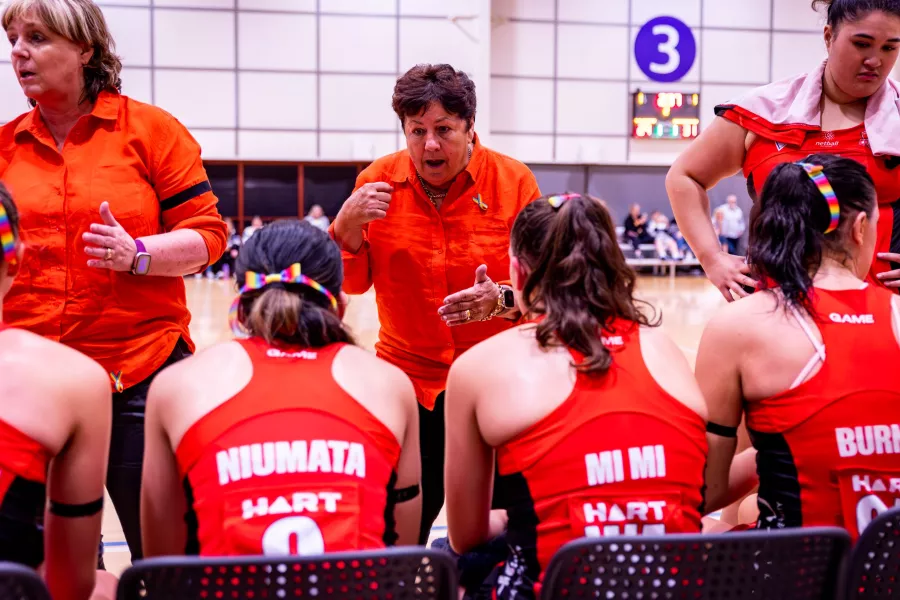LIZ WHITE OAM is quick to shy away from the title of former Queensland Firebird, and will argue her profile quite frankly does not belong in this series, yet the Netball Queensland life member is one of the sport’s most influential figures.
White was deep into player retirement when the inaugural Firebirds team competed in 1997, after a career-ending knee injury curtailed any ambition of longevity at the elite level.
“I didn’t start playing netball until I was around 14,” White said of her debut with the Aspley Gonks.
“I can honestly say I didn't, as a kid, dream of playing for Australia in any sport. I loved swimming but I was hopeless at it.”
Surprising given White’s father, Gerald Comadira, represented Queensland at both waterpolo and surf lifesaving.
“I was in the Queensland schoolgirls athletics team and ran the 800 metres so I was more successful in athletics, but neither athletics nor swimming held the same appeal as netball,” White said.
“I loved netball. I guess that competitive streak was always there and I just wanted to be better. I wanted to be the best that I could be.”
White was dominating B-grade level at Downey Park Netball Association during her university years when former Queensland Netball Association president Deirdre Hyland encouraged her to trial for the Queensland Under 21 team.
Immediately promoted into the Open ranks, White said Queensland regularly competed for the “last-placed shield” against interstate rivals until New Zealand powerhouses Pam Barham and Fran Wiringi arrived on the scene.
“Fran used to say to me that I had to throw the ball harder, that it was too soft and she would go mad at training where she'd belt the ball at you so you couldn't catch it,” White said.
“She didn't count on my nature, because my nature was, ‘I'll show you’. I remember being at Kempsey on holidays and I was belting this ball. When I came back to training Fran said to me, ‘you don't have to throw it that hard’.”
It was Barham who taught White how to train to capacity, and the benefit of fitness sessions including running three kilometres within 12 minutes.
“I was the centre and she wouldn't let me go into the goal third at training, or in some games, so I learnt that I didn't get every second ball on the court,” White said.
“It was a valuable lesson, an unorthodox way to coach but the lesson sunk in and I knew my role.”
While Hyland, who was the Australian team manager of that era, imprinted a lasting regard for officials and the rules of the game on White during her cruelly-shortened stint in national colours.
“We played Trinidad and Tobago and it was rough, the wing defence was in the goal circle sort of thing,” White said.
“I don’t know whether she (Hyland) thought that we retaliated but we all got handwritten letters telling us she would’ve been more proud had we got thrashed than exhibiting the behaviours we did, and that was not the way to win netball. I was mortified and I don't know if it influenced my playing as much as it influenced my coaching.”
White had given up on playing for her country by the time she got the call up following a national tournament in 1980.
“I still remember sitting there when my name was read out,” she said.
“I can see myself there, I know what I wore even. They were formal dinners then, and whoever I thought would have been the centre wasn't read out. I was a stunned mullet, could not believe it.”
A knee injury in 1982 delivered a heartbreaking early end to her Australian duties, launching a coaching career now the envy of many.
“I was devastated and gutted, not thinking I’d ever survive it,” White said.
“I tried acupuncture, I tried everything, and cried my little heart out trying to get over that. Fortunately, Barham always insisted when we were in the top club team at Valleys that we also had to coach. I learnt to give back and so when I stopped playing, I coached.”
There’s been little reprieve since, with White going on to coach Queensland for a decade before securing an unprecedented 17 premierships for the Brisbane North Cougars during the past 23 years.
“I find it’s such a simple game and yet you can make it as complex as you like,” she said.
“At the end of the day, it’s passing and catching isn’t it? And the better you do that, the more likely you are to win. You get 50 per cent of the ball so if you can control the ball when you’ve got it and interrupt it at other times you’re going to win. That’s my theory.”
White credits her teaching experience with helping her understand the athletes beyond their sporting ability.
“You deal with so many different characters as a teacher and so you gain an instinct as to what makes someone tick,” she said.
“The players recognise that you genuinely care about them.”
White’s coaching prowess has propelled relatively unknown names to Australian Diamonds and Queensland Firebirds stardom, with her Cougars camp a widely acknowledged breeding ground for representative talent.
“I do my best to have them achieve their dream,” she said.
“I have been so privileged to have had so many wonderful athletes come to me and ask me to be a part of their journey. I know it sounds crazy but I'm just glad that each of them feels like they got what they wanted out of netball because then they’ll love the game.”
Netball Queensland (NQ) is formalising its connections with former Firebirds through the establishment of the Former Firebirds Nest.
This initiative aims to connect NQ with former players, to continue to cultivate a sense of belonging and provide opportunities for all former Firebirds to strengthen a network with each other and the current Firebirds playing group.
